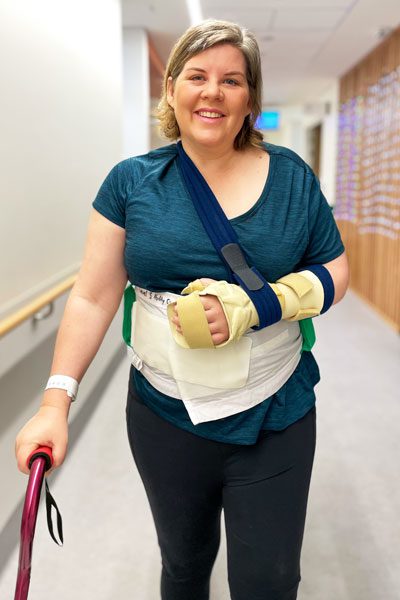Louise is part of a growing number of young stroke survivors

Young stroke patient Louise during her rehabilitation at STARS
Strokes are often thought of as affecting older people, but a significant number of strokes occur in young people every year and the number is growing. In 2020, almost a quarter of first-ever strokes occurred in people aged 18-54 years old in Australia, an increase from only 14% in 2012.
Raising awareness of the prevalence of strokes in younger people is important otherwise young people experiencing stroke-like symptoms may delay treatment.
In addition, the impacts of a stroke on younger people are often different to that of older people. For example, younger stroke patients experience greater disruptions to their career and future earnings and aspects such as raising young children.
Mum of two primary school-aged daughters, Louise Cumberland, 42, is one of the increasing numbers of younger patients affected by a stroke. Louise suffered a significant stroke and brain bleed in May 2023. She spent four weeks in ICU in a coma but her fighting spirit prevailed and she gradually regained consciousness.
Louise was transferred to the Surgical, Treatment and Rehabilitation Service (STARS) where she has embarked on her rehabilitation journey. At STARS, Louise was supported by the Brain Injury Rehabilitation Unit (BIRU) team, including physiotherapy, occupational therapy, speech therapy, psychology, medical, social work, clinical assistants and nursing services.
BIRU Physiotherapy Team Leader Dharsha saw the progress that Louise made at STARS after her initial arrival in a tilt-in-space wheelchair because she was unable to sit unsupported.
“Louise demonstrated resilience and courage, working hard in every therapy session she had at STARS. As a young stroke survivor, the goals that we worked on with Louise were not only focussed on her being discharged from hospital but were aimed at her achieving future goals such as cycling and returning to work,” Dharsha said.
“The comprehensive and collaborative approach of the BIRU team, ensured Louise’s rehabilitation was holistic, progressing towards improved independence.
“Louise, with the support of her husband, also made the most of the multiple opportunities for Weekend Pass during her STARS admission. Weekend Pass provides appropriate support so a patient can spend the weekend away from hospital. This
gave Louise and her family an opportunity to see what was working at home and then come to us with more therapy goals.”
Louise’s determination and assistance from the BIRU team saw her accomplish a great deal.
“Thanks to the help of the team at STARS I was able speak a lot better, eat food, and began walking again,” Louise said.
“My initial goal was to eat a croissant and have a coffee which I’ve done, now my next goal is to get back on bike and go for a bike ride with my two young daughters.
“I have a new view on life, I am so grateful to be alive – it puts everything into perspective including how to respect and care for my body.”
For more information on stroke in younger patients, see the Stroke Foundation’s Young Stroke website and the genyus network.
